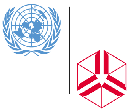
network of research and training centres and programmes
Issue 23: February 2003
 |
UNU Update | |
| The newsletter of United Nations
University and its network of research and training centres and programmes |
||
|
Issue 23: February 2003 |
||
|
Rocky road to democracy A new book from UNU Press, Democratization in the Middle East: Experiences, Struggles, Challenges, addresses a number of key issues determining the success or failure of sustainable democratization in the region. With the exception of Israel, the constituent states have yet to reach a level of democratization that would guarantee a path towards sustainable democracy and prevent a future return to non-democratic governance, and de-secularization and de-liberalization of the economy and society. Peace dividends from sustained democratization processes in the Middle East are still years away from realization. If anything, movement towards political, economic, and cultural liberalization has thus far brought instability and violence to the region, as traditional and religious values continue to clash with secular ethics, norms, and practices. Drawing on conceptual and country analyses, Democratization in the Middle East examines patterns of democratization; costs and benefits, barriers and support of democratization; relationship between civil society and the state; internal and external factors of democratization; the relationship between Islam and Islamic movements and democratization; experiences of democratic transition processes and resulting national and regional peace dividends; and the interdependence of development, peace and democratization, and political and economic transition. The contributors come to the conclusion that, in order to advance democratization processes throughout the region, reforms must be gradual and must be organized and monitored from the top, while supplemented by a similarly gradual process towards the establishment of a broad-based and broadly supported civil society. Only such gradual reform processes will be successful in creating participatory, just and, eventually, peaceful and stable societies in the Middle East. The book is edited by Amin Saikal, Professor of Political Science and Director of the Centre for Arab and Islamic Studies (The Middle East & Central Asia) at the Australian National University, Canberra, and Albrecht Schnabel, an Academic Programme Officer in the Peace and Governance Programme of the United Nations University, Tokyo. |
|
Copyright © 2002 United Nations University. All rights reserved. |